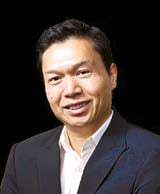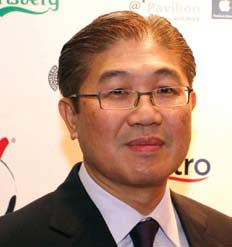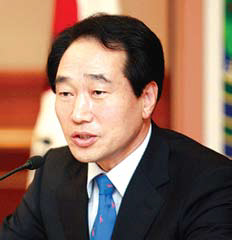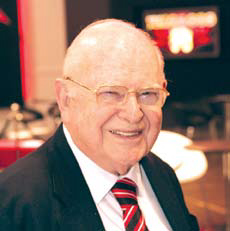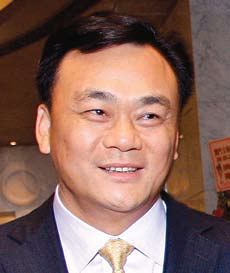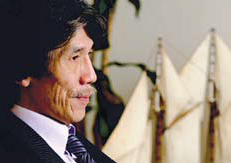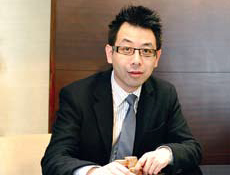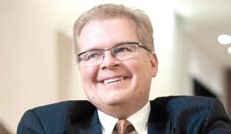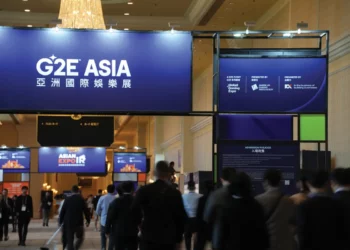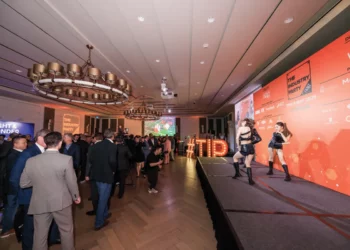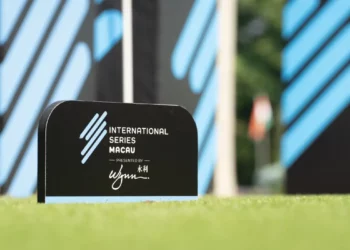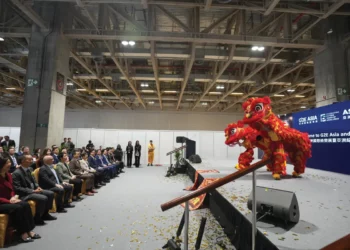41 Ryoo Hwa-sun
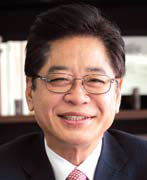
President and Chief Executive
Grand Korea Leisure
Grand Korea Leisure is a semi-private owner and operator of three foreigners-only casinos in South Korea. GKL actually was set up by the South Korean government in 2005, through the Korea National Tourism Organisation, to boost tourism and generate income to fund tourism infrastructure and other government projects. The company has since opened three casinos—two in Seoul and one in the port city of Busan—under the popular Seven Luck brand.
Before GKL’s arrival, Paradise Group had held the lion’s share of the foreigners-only market for almost four decades, but GKL quickly snapped up share, and by 2010 held an estimated 54% of the foreigners-only business, estimated to be worth just over KRW1 trillion (US$885 million), while Paradise’s share had dwindled to around 30%. Paradise has launched a vigorous counter-offensive, however, taking its share of the market back up to 50% as of the second quarter of 2012, while GKL’s share slid to 42%. The battle rages on. Which is where Ryoo Hwa-sun comes in. Mr Ryoo has the ear of many lawmakers and civil servants, having served as a member of a presidential committee on regional development and later as mayor of Paju, a small but important city, strategically located just south of Panmunjeom on the 38th Parallel and home to several ROK and US military installations.
In November 2009, GKL floated 30% of its equity on the Seoul Stock Exchange. There was talk of more stock being sold to private investors, but the company is still majority-owned by the government, which recently announced an end, come 2015, to Kangwon Land’s monopoly on Korean players, a sizable market in its own right, worth about US$1 billion annually. Authorities say that licensing for at least one new venue catering to domestic players will take place in 2015 or soon after. In fact, official plans currently call for the licensing of up to five resort-scale casinos over the next decade or so.
GKL’s gross revenue grew 8% year on year in 2011 to KRW524.9 billion (US$464 million), which was below analysts’ forecasts. Considering the company faces intensifying competition from not only Paradise at home but also from a slew of new integrated resorts in neighboring Macau, the Philippines and Vietnam, GKL will be pinning its hopes on securing one or more of the new licenses in order to boost growth. And Mr Ryoo’s connections could be a differentiator in terms of the company’s ability to access these opportunities.
The last time a new foreigners-only license was issued—in 2005— it went to GKL. Given that GKL and Paradise Group are probably the only home-grown operators with the experience and contacts to be able to attract foreign joint-venture partners, they have to be considered frontrunners for the new resort and/or domestic licenses when the government finally does make its move.
42 Clarence Chung
Chairman and CEO
Entertainment Gaming Asia
Clarence Chung has his work cut out for him, taking US-listed Entertainment Gaming Asia, formerly Elixir Gaming Technologies, from its roots as a supplier and operator of machine games into a developer of casinos in its own right.
If that’s not enough of a challenge, he is trying to remake the company in Cambodia, and primarily in the border areas of the country, historically dodgy locations best known for semi-legal, gray-area gaming operations.
While it’s too early to tell yet whether it’s a winning strategy, early reviews about and feedback on EGT’s first DreamWorldbranded casino, which opened in May at the Pailin border crossing with Thailand, are positive. The facility, with about 50 machines and 12 tables, is said to be in a more sophisticated league altogether compared with the local competition. Next up is DreamWorld Poipet, located at a more active Thai checkpoint. That operation is on schedule to open in early 2013. A third DreamWorld, planned for Kompot, will target players from Vietnam.
EGT’s push to diversify is a tribute to Mr Chung’s ability to look beyond the company’s traditional role as a supplier and operator of machine games on a revenue-sharing basis, most of it in Cambodia and the Philippines. Currently, more than 40% of the company’s distribution is concentrated with a single customer—NagaCorp’s Phnom Penh flagship, NagaWorld—and that agreement expires in 2016.
As for the emerging-markets focus, it’s a familiar one for EGT dating back to its Elixir days, and by all appearances it’s a sound one. While NagaCorp has a monopoly in Phnom Penh, the rest of Cambodia is free for casino development. The border areas are also closer than the capital to the key feeder markets of Thailand and Vietnam. Similarly, the purchase some years back of Dolphin Products, an Australia-based, Asia-facing supplier of chips and plaques, has enabled EGT to broaden its appeal and gain access to Macau and other bigtime casino markets.
Mr Chung came to EGT with a strong background in management and finance, most recently as an investment banker at Lazard and a vice president of Pacific Century Group. He also serves as an executive director of Hong Kong-listed Melco International Development, a major shareholder in EGT.
Certainly the investment community likes the way he thinks. Since he took over as CEO of Elixir in October 2008, the company’s stock price has doubled, outperforming both the Hang Seng and the S&P 500.
43 Lee Choong Yan
President and COO
Genting Malaysia Bhd
While the announcement of a Singaporean casino duopoly—with Genting being awarded one of the coveted slots—was always going to be a boon for the Malaysian company, the competition with Casino de Genting at the company’s flagship Genting Highlands resort complex north of Kuala Lumpur was also a serious threat.
But Casino de Genting has weathered the successful opening of its neighbor fairly well, so much so that it continues to expand.
Gaming in Malaysia has traditionally been mass market-focused, but the company is now setting its sights on growing the VIP business. According to RHB Research, Genting is aiming for its VIP business to contribute 40% of gaming revenue within the next three to five years, up from its current 36%. And this will incorporate overall top-line growth of 5% to 7%.
One way Genting is doing this—and also addressing its currently high hotel occupancy—is by building a new 700-room hotel situated next to its existing First World Hotel. Construction is set to commence next year, and the new digs will be targeted toward the higher-end of the market.
According to analysts and market observers, much of the casino’s growth and success is attributable to Lee Choong Yan.
“I think he’s done a pretty good job given the competition from Singapore. The Malaysian revenues have held up quite well despite the competition,” says one Malaysia based gaming analyst. “They expanded their casino by a bit, added about 10% to the cross-gaming floor area, they’ve done a lot of marketing … and have managed to keep and maintain the younger gamblers’ interest.”
And while Genting’s sights look firmly set on expanding their global operations, it will need to rely on steady management from domestic executives like Mr Lee to make sure the home market remains rock solid.
44 Lam Man Pou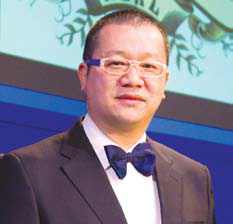
Chairman
Asia Entertainment & Resources Ltd
As founder and chairman of Asia Entertainment & Resources Ltd, Lam Man Pou is the archetype of a new breed of Macau junket investor, heading up a Nasdaq-listed holding company whose VIP room subsidiaries and related promotional entities saw net income more than double last year to US$77.3
million and figure to be even more profitable in 2012 once the company completes a shift of its remuneration model from fixed commissions on rolling chip turnover to sharing revenues with its casino clients.
Under Mr Lam’s seasoned guidance—he started as a junket agent for Stanley Ho’s Sociedade de Turismo e Diversoes de Macau back in 1990 and was sole proprietor of his own VIP rooms for a time in the postmonopoly era—AERL has grown from US$45 million in cage capital at its inception two years ago with the acquisition of VIP promoters Asia Gaming & Resort Ltd to more than $260 million, with 29 tables in rooms in Galaxy Macau and The Venetian Macao in the Cotai resort district and Galaxy’s StarWorld downtown. The company recently added to its portfolio with the acquisition of a junket with five tables in City of Dreams.
It’s the solidity of the company’s financial footing that has Mr Lam confident AERL can weather the volatility implied by a revenue split—which commits the promoter to an agreed percentage of a room’s win but requires it also bear the same percentage of possible losses—to become an even stronger and more diversified concern. AERL believes it can generate the equivalent of commissions on rolling chip turnover considerably higher than the established 1.25% cap, which figures to be a lot of money for a company that grew turnover 91% last year to almost $20 billion. It will also have the ability to negotiate with its casino partners on additional allowances and incentives. Moreover, alignment with the prevailing business model in the sector opens up the potential for expansion into rooms in MGM Macau, Wynn Macau and the casinos of SJM Holdings (which do not operate on fixed commissions).
Overseeing this transition, probably the most significant in AERL’s young life, Mr Lam remains as ever the guiding force behind strategy, development and marketing.
45 Choi Hung-jib
President and CEO
Kangwon Land Inc
Choi Hung-jib, 61, is a former governor of South Korea’s Gangwon Province—the economically depressed former coal mining region where the majority state-owned Kangwon Land casino is located. He is the seventh person to head the resort since it was founded in 2003 as, in effect, a regional sovereign wealth fund designed to plough its profits back into the regional economy and community. He replaced Choi Yung, who resigned amid an investigation into allegations of corruption.
Kangwon Land is the only one of South Korea’s 17 casinos where Koreans are allowed to play, and owing to that exclusive position, generates a great deal of money. On weekends, eager city dwellers pay local grannies the equivalent of hundreds of US dollars just for reserving seats for them at the tables. The property generates gross revenues in excess of US$1 billion per year.
It’s perhaps not surprising, therefore, that at times the resort seems to be a bit of a football for the country’s politicians to kick about.
The casino opened in March 2003 with 30 tables. Following 18 months of steady capacity expansion, the National Gaming Control Commission imposed a cap of 132 tables in November 2004 in line with government orders to limit the casino industry’s income. That cap is still in place and has meant revenue growth has been sluggish. The casino also offers 960 video slots that are upgraded regularly via a rolling acquisition program. Revenue grew 3.4% year on year in the second quarter to KRW305.8 billion (US$270 million).
There is mounting speculation that the table cap could be lifted following an extensive expansion program that was completed in May. The company is currently negotiating with the Ministry of Culture, Sports and Tourism to use some of the extra space to expand the casino and is also lobbying for more table games. Kangwon Land is clearly capacity-constrained, and any lifting of the table cap should translate to a pickup in revenue growth.
Political involvement in commercial ventures can have its upside as well as downside—especially in East Asia. South Korea chose Gangwon Province as the venue when it made a winning bid for the 2018 Winter Olympics. The event will be held at Pyeongchang, up the road from Kangwon Land. The property—which itself has a ski resort—is likely to benefit from the huge influx of visitors expected in the region.
The downside of government involvement is that no matter how successful Kangwon Land has been—including overcoming the not inconsiderable handicap of being 125 miles and four hours’ drive along difficult mountain roads from the capital of Seoul—as a publicly owned venture, it constantly risks having the rug pulled from under it.
In 2011, management was informed that Kangwon Land would in principle lose its exclusive right to serve domestic gamblers when the original authorization expires in 2015. Worse, there’s talk of granting a license for a locals casino at Incheon, just up the road from Seoul and in the middle of the country’s most populous conurbation, home to 24.5 million people—half the country’s population. It will be interesting to see whether Seoulites will still be willing to spend hours driving to Gangwon for their casino fun if they have an alternative on their doorstep.
It’s not all bad news for Kangwon Land though. In anticipation of the Winter Olympics, the national government is planning to build an upgraded road to connect Pyeongchang and the county of Jeongseon, where Kangwon Land is situated.
46 Leonard Ainsworth
Executive Chairman
Ainsworth Game Technology
In a world where success is increasingly measured in financial quarters, Len Ainsworth’s longevity stands out. He has been involved in the gaming industry for 59 years, starting out in 1953 by taking over from his father a company he would eventually transform into Aristocrat Leisure.
Mr Ainsworth has long been acknowledged as one of the fathers of slot and electronic gaming in Australia. He is widely credited with helping to create a sustainable business model for the country’s massive clubs industry through his development of poker machines.
Mr Ainsworth gave up control of Aristocrat in the mid-1990s after helping to turn it into an internationally renowned supplier of slots, systems and related services. By then, he was in his 70s, but his appetite for business-building was undimmed. He set up Ainsworth Game Technology in 1995. The company listed on Australia’s ASX in December 2001. It now employs more than 300 people and exports worldwide.
AGT has greatly increased its share of the Australian market with the strong performance of its Ambassador SL platform and A560 family of cabinets. In the six months ended 31st December 2011, revenue soared 56% year on year to A$68.3 million. Notably, within that total, $16.8 million was made up of international sales, representing a 98% year-on-year increase and signaling what looks to be the start of AGT’s growing prominence outside Australia.
As part of the company’s efforts to establish itself as a serious player in the North American market, it has set up a new Las Vegas headquarters and started manufacturing there. Mr Ainsworth says there are significant advantages to manufacturing in Vegas: “It’s traditionally the source of new and forward technology, and Las Vegas has a reservoir of skilled and experienced people necessary for success.”
Mr Ainsworth, now in his 89th year, has received numerous awards in his native Australia and overseas for his many contributions to the industry—at G2E Asia 2010 in Macau he was presented with the “Asia Visionary Award” by Frank Fahrenkopf, president and CEO of the American Gaming Association.
AGT’s reins have since passed into the capable hands of industry veteran Danny Gladstone, formerly of Konami Australia, who was appointed CEO in February 2007. But Mr Ainsworth remains very much in the public eye and is a regular on the gaming trade show circuit. As he explained in an interview with Melbourne-based The Age, “I’m invariably asked, ‘What do you do?’ And my answer is that I ride shotgun. By looking and listening and watching what’s going on and by getting out and meeting and greeting the customers.”
47 Jack Lam
Chairman
Jimei Group
Jack Lam may not be quite the force in the “new” Macau as he surely was in the old, but the chairman of Jimei Group still sits atop an empire consisting of holdings in property investment, financial services and tour and travel, and with a longtime presence in gaming in the region consisting of a casino cruise ship, resort casinos in the Philippines, VIP rooms in Macau and a highend room in one of Seven Luck’s popular foreigners-only casinos in Seoul.
In the Macau junket sector, which accounts for much of the heft of Mr Lam’s bulging portfolio, Jimei’s VIP rooms are believed to generate about 9% of total rolling chip turnover, and as a measure of Mr Lam’s prominence, he is one of the few junketeers to run a property in his own right, having taken over the Casino Oriental at the former Mandarin Oriental back in 2009 with the blessing of its owner, Stanley Ho’s Sociedade de Jogos de Macau. Located under the roof of the renamed Grand Lapa Hotel, the refurbished and rebranded Jimei Casino operates as a “satellite” of SJM in exchange for a share of revenues.
But the Philippines remains the most audacious of the investments the 51-yearold Guangdong native has pursued, and Fontana Leisure Parks, a sprawling holiday getaway he’s assembled around 300 hectares of a former US military base north of Manila, is certainly his most imaginative.
Mr Lam had been running gambling packages to the Philippines from Hong Kong, Taiwan and South Korea for years and cultivating relationships along the way with politicians and government officials that paid off with VIP rooms in casinos in Pasay City and Cebu and a controlling interest in the Fort Ilocondia Resort and Hotel on the South China Sea in northern Luzon.
But it’s the Fontana complex, located in the Clark Special Economic Zone about 80 kilometers north of the capital, that has grown to become Jimei’s flagship—a collection of family-style holiday villas and time shares, a hotel, a waterpark, golf courses, fitness facilities, a sauna and spa, restaurants, meeting and convention space and a boutique casino—a leisure city within a city, catering both to locals and to a Chinese and Korean clientele that Jimei has come to know intimately over the years. Fontana is also a destination, interestingly enough, whose aggregation of mixed uses prefigures in some respects the multibillion-dollar Entertainment City currently under construction in Manila and on which such great hopes ride for the island nation’s tourism.
48 David Chow
CEO
New Macau Landmark Development
David Chow first announced the idea of installing a dinosaur museum at his ailing Fisherman’s Wharf theme park in Macau in 2007. In 2009, he said the museum would be part of a HK$3 billion (US$385 million) redevelopment of the facility scheduled for completion within two years that would also include two hotels, a yacht club and health center. That redevelopment has yet to commence.
In its current, largely unoccupied state, Fisherman’s Wharf resembles a relic of the old, obsolete Macau though it only opened in 2006. In 2009, several hedge funds that had invested in the project—hoping it would cash in on Macau’s gaming and tourism boom and go on to a stock market listing— including Och Ziff and TPG-Axon, accepted a heavily discounted buyout of some HK$400 million that they had loaned it.
The good news is that the site, on the southwest side of the city’s Outer Harbour, is one of the best pieces of real estate in town. A revamp of the site—if it ever happens—could help the area become the tourist hub it was always meant to be.
Also slated for a major refurb is Mr Chow’s Landmark Macau Hotel and the co-located Pharaoh’s Palace Casino, which likewise have a great location on Friendship Avenue, along which Sands Macao, StarWorld, Wynn Macau and the Grand Lisboa also sit. Landmark does considerably better business than Fisherman’s Wharf, though it, too, could benefit from a makeover to boost its competitiveness relative to its recently arrived neighbors.
Last year, Mr Chow, a Hong Kong native and former Macau lawmaker, raised a HK$1.8 billion (US$232 million) syndicated bank loan for investments in Macau, including giving the Landmark, and presumably also Fisherman’s Wharf, their facelifts. The Landmark renovation is scheduled to take a year and includes plans to create Macau’s biggest sauna—which in this part of the world is a cross between a spa and a gentleman’s club—within the property. Like the renovation of Fisherman’s Wharf, however, the work is still pending.
When Mr Chow finally does get to making over his properties he could well bounce back in style. There’s still an important segment of the Macau market that wants upscale accommodations with a distinctively Chinese management and service culture, and given Mr Chow’s local connections and mindset, as well as the prime locations of his properties, he is ideally suited to fill that niche.
49 Winfred Yu
President
Kings Consulting Ltd
Poker’s worldwide popularity has yet to make the leap to the world’s largest gambling market, but that’s changing, albeit slowly, thanks in part to Winfred Yu, an enterprising poker pro who combines an aficionado’s love for the game with a unique flair for marketing.
Mr Yu, a fixture on the Asian tournament circuit, learned the ropes as the manager of a casino poker room in Ontario, where he emigrated with his family from Hong Kong as a teenager. He’s returned to his native country with a novel concept called Poker King Club, a spacious, impressively appointed 11-table salon on the third floor of StarWorld Hotel and Casino that’s been generating considerable buzz as home to the “Big Game,” where whales normally found at the city’s high-stakes baccarat tables are swimming in droves to test their moxie and their bankrolls against top pros in Texas Hold ’em contests with blinds running as high as HK$30,000/$60,000.
Mr Yu believes Poker King Club has the potential to bring poker in from the cold in Macau by combining the best elements of VIP marketing with a bit of Hollywood-style romance and good old-fashioned mass market hustle.
Backed by young junket lion Suncity Group in partnership with Mr Yu’s Macaubased Kings Consulting, Poker King Club manages, promotes and staffs the room in exchange for a fee, an arrangement that makes it a bit more palatable financially for StarWorld to diversify its baccarat-centric offering. It’s a model that’s employed with success in casino sports books the world over, and one Mr Yu and Suncity hope to replicate throughout the region.
Staffed with hostesses and chip runners and fitted with all the comforts and services a high roller would expect, Poker King Club also has introduced innovations the average player can appreciate: like a rewards card; a “Refer a Friend” program; daily “Lucky Lottery” drawings; food and beverage promotions; and special tables where beginners can play for free and PKC’s “Poker Girls” are on hand to provide instruction.
“Poker Secrets,” another brainchild of Kings Consulting, launched earlier this year on Macau’s free satellite broadcaster Lotus TV. It’s a mix of ESPN-style game coverage with tutorials, guides and commentary which Mr Yu hopes will carry the word into the millions of households across East Asia that comprise Lotus’ reach.
50 Paul Steelman
CEO
Steelman Partners
Paul Steelman has reached almost iconic status in the world of casino design, with the mere attachment of his name to a project sufficient to generate excitement among industry analysts, and even gamblers.
His masterpieces can be spotted instantly in Macau. He first established a name for himself in Asia by inventing the stadium-style casino at Sands Macao, which opened in 2004 as the city’s first decidedly mass-market gaming venue. His firm, Las Vegas-based Steelman Partners, went on to create distinctive designs for the Hard Rock Casino at Melco Crown Entertainment’s City of Dreams and the cheap and cheerful conversion of a department store to create SJM’s Oceanus.
Using lessons from behavioral psychology, Mr Steelman has formulated a set of “rules of casino design” that work to lure people into a property and keep them there. These rules include ensuring that exits—actual exits, not just exit signs—are clearly visible (which apparently keeps players at the tables for an average of five minutes longer) and using curved rather than straight corridors (which makes visitors feel there is more to the property than they have seen, encouraging them to return).
According to Mr Steelman, today’s architectural trends can often end up as tomorrow’s design disasters—“themed” casinos, for instance, which he considers faux pas. One sinking copycat theme we were spared was a Titanic casino. In 1998, immediately after the movie’s box office success, he recalls, “A guy called me up and brought in a drawing made by a sign guy. Here was the Titanic casino with melting ice in Las Vegas. That year, I saw four people come in with the Titanic casino idea.”
He also has strong views on high-limit gaming areas, having designed them for Galaxy Macau, The Venetian Macao and The Plaza Macao. He has led the move away from the traditional Asian VIP gaming room, basically “staid, wood-paneled, windowless Louis XIV rooms,” to facilities that are more space-based than decor-based. “How excited can you get over the wood-paneled room?” he once asked in an interview with Inside Asian Gaming. “I think high-rollers like it a little simpler, to be honest.”
More recently, Steelman Partners has been involved as architect and interior and lighting designer for MGM Grand Ho Tram in Vietnam and Solaire in Manila. Expected to open in 2013, MGM Grand Ho Tram will be the first of five large-scale integrated resorts planned for a section of coastline in Vietnam near Ho Chi Minh City. In the Philippines, construction work for the US$1 billion Solaire commenced in 2010. It is the first of four resort casinos expected to open on a strip of reclaimed waterfront land in Manila Bay called Entertainment City. The firm also has received several new large-scale entertainment design commissions in China, and outside the region is juggling multiple projects from the United States to continental Europe.
Born in a casino town—Atlantic City—Mr Steelman currently splits his time between homes in Las Vegas and Mammoth Lakes, California. In 2010, Steelman Partners was ranked by Architectural Record magazine as the 56th largest architectural firm in the United States, with more than US$59 million in revenues.
Next: About the Associate Sponsors







